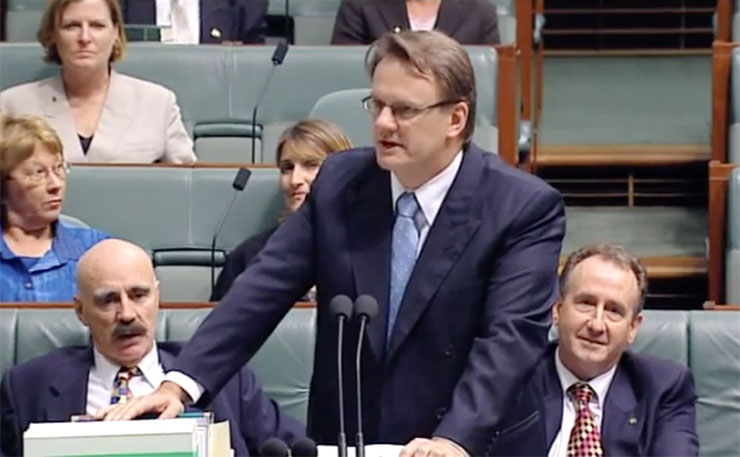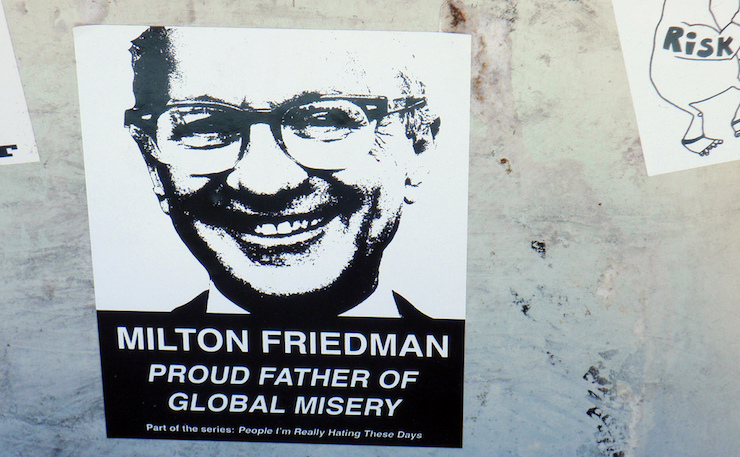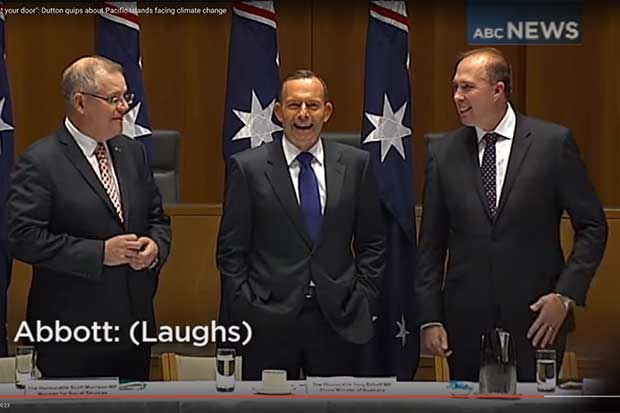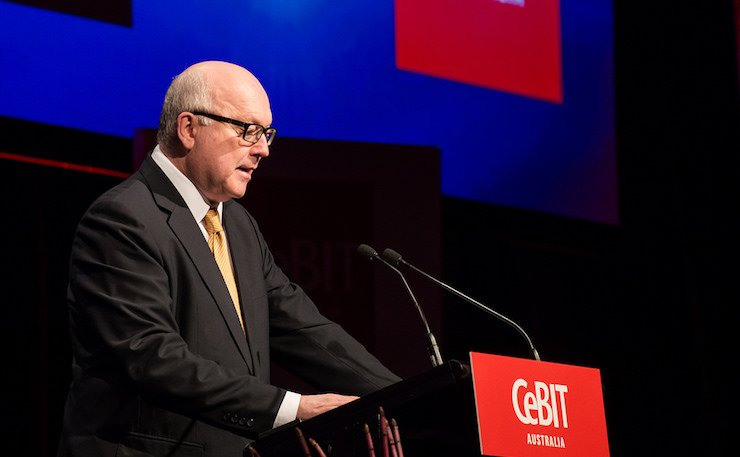Obsessed with the idea that the free market can cure any ailment, admitting the scale of government intervention demanded by climate change would be too much for the Coalition. That’s why George Brandis is an ‘agnostic’ on the theory of climate change but not gravity, writes Sean Hosking.
The difficulties experienced by members of the political right in Australia to come to terms with global warming have been well documented, from Barnaby Joyce’s folksy argument about the daily temperature, to Maurice Newman’s grand conspiracy theory involving a well organised cast of fraudulent white coat criminals, menacing one world order bureaucrats, and various other leftist malcontents.
While such examples are on the extreme end, anecdotal evidence suggests that over 30 per cent of Coalition members do not accept human induced global warming as a reality, or as per the preferred party line, ‘do not accept that the science is settled’. Government Ministers George Brandis and Fiona Nash recently identified themselves as part of this group.
In the face of the global scientific consensus and evidence, now emerging of an alarming spike in global temperatures, the fact that those entrusted with promoting the welfare of the nation continue to hold such views is cause for astonishment and alarm.

Nash is a National Party senator representing farmers and rural people living on the driest inhabited continent on earth and the one that stands to be hit the hardest by a warming climate. Brandis is a former QC, the chief law maker in the land, and ostensibly at least not lacking in cognitive capacity. There is no evidence that either of them have sought to contradict mainstream science on other matters of general consensus such as the theory of general relativity or laws of planetary motion. Yet there they are spouting opinions on climate science that you might normally expect to encounter from somebody in a tinfoil hat standing on a milk crate.
How can this be so? How can observed reality continue to fail to penetrate and shift the belief systems of people who should know better. The answer, to a significant extent, is ideology.
Ideology is a term that is bandied around a lot, often without any real clarity. Yet given its importance, and that it currently has us teetering on the edge of a climate precipice, it may be time to extract it as a concept from the halls of academia and post-modern theory for a closer look. What is it, how does it maintain its social dominance, and why is it currently under siege from the politics of global warming?
In popular usage ideology most typically denotes partisan political belief systems and values that are deemed to be doctrinaire, inflexible, and extreme.
The political right’s current preoccupation with the ideology of “cultural Marxism” offers a useful guide. First there was Chris Uhlmann’s disturbing account of his rough handling by the ‘politically correct’ twitterati which, in a comment piece for the Australian, he ingeniously traces back to the post-war Frankfurt School’s subversive cultural project to “transmit the intellectual virus (of Marxism) to the United States”.
More recently there were Mark Latham’s insightful observations that the Safe Schools Coalition represented a desperate act by a politically defeated left to send a “neutered Marxist feminist Trojan horse into our schools to re-engineer our children’s sexuality and values” (don’t try too hard to get your head around that or it’ll keep you awake at night).

Trying to fully comprehend (and digest) these offerings is difficult, but in essence what Uhlmann and Latham appear to be taking exception to is any attempt to rigorously question the status quo as defined through their right-wing conservative perspective on the world.
Minor policy bickering between the major political parties aside, for them the established social order is not essentially ideological – that is, a legitimately contestable realm of ideas and values subject to relations of power. Instead, it is a fixed, neutral and rational order, built on, as Uhlmann puts it, “foundation stones”.
In this worldview, ideology is the exclusive purview of disaffected out-groups such as feminists, Marxists, and environmentalists, the dissident political views of whom are automatically written-off as forms of radical propaganda and politically correct censorship rather than instances of legitimate free speech.
Yet at the risk of being derided as a transmitter of an intellectual virus by the ABC’s political editor, while there may be a broad consensus on the importance of certain social values, ideology in reality permeates every social order since all such orders are ultimately contingent. They are the result primarily of political choices rather than fixed truths. To believe otherwise would be to ultimately call into question the need for democratic governance, since a static and settled social order would lend itself to autocratic rule.
Though dominant or hegemonic ideologies are popularly conceived as being synonymous with reason and common sense, in reality they function to a significant extent at the symbolic level as allegories or extended metaphors that seek to define, interpret, and classify the social order in ways that are compatible with the specific social interests that they represent. This is typically achieved through the production of various emancipatory myths related to, for instance, prosperity, growth, and personal well-being, the realisation of which is perpetually sabotaged by antagonistic social identities.
Neoliberalism and its range of business friendly neo-classical economic and free market prescriptions has been the dominant ideology in the western world for the last 30 years. Through its prioritisation of the interests of private capital, its fetishisation of the competitive free-market as an efficient and equitable allocative mechanism, and its attacks on ‘non-market’ actors such as big government, the bureaucratic nanny state and trade unions, neoliberalism has been spectacularly successful at dominating social and political institutions and shaping popular perceptions and expectations.

Yet as with any system of control, neoliberal ideologues are engaged in a constant battle with real world events in order to ensure that social perceptions remain compatible with ideological representations. And it is in relation to this battle that we come closer to understanding the psychology and behaviour of Brandis, Nash, and the other ideological warriors of the political right in regard to global warming.
While neoliberalism offers utopian social imaginaries of economic growth and prosperity, its propensity to instead produce undesirable real world outcomes such as inequality, high unemployment, stagnant growth, boom and bust cycles, and falling living standards — particularly when measured against the Keynesian Social Democracies of the post-war era — necessitates the ongoing employment of a range of strategies to maintain social dominance.
The most prominent of these is reversion to a deterministic conception of the free market as natural, neutral and irresistible: an elemental ordering mechanism or ‘phenomenon’ that essentially requires human compliance and submission rather than political engagement.
Thus, the political realm is typically dominated by the policy imperatives of the dismal science with its arcane economic modelling, spaghetti graphs and market projections, most of which are routinely shown to have no correlation with the real world. This failure is rarely remarked upon since ideologically what is important is the appearance of rational management and the related inference that political choice is no longer an option.
 The result is a widespread cynicism in regard to the political process and public contempt for a political class who, bereft of any real power, are forced to revert to ever more elaborate and absurd simulations of leadership typically involving liberal use of the Australian flag, national security fear mongering and the scapegoating of ethnic minorities, the weak and the vulnerable. Such a degradation of the political realm is cause for concern for some, but for ideologues it is nothing short of a triumph.
The result is a widespread cynicism in regard to the political process and public contempt for a political class who, bereft of any real power, are forced to revert to ever more elaborate and absurd simulations of leadership typically involving liberal use of the Australian flag, national security fear mongering and the scapegoating of ethnic minorities, the weak and the vulnerable. Such a degradation of the political realm is cause for concern for some, but for ideologues it is nothing short of a triumph.
When all else fails the deficit between real-world outcomes and ideological promises can also routinely be attributed to the ‘market distortions’ of antagonistic social entities such as trade unions, ‘red tape’ bureaucracies, special interest groups or interventionist/high taxing governments who compromise the purity of the free market in much the same way as tailings from a coal mine contaminate the natural cycle and purity of a river stream.
The religious undertones are obvious. While the spiritually devout talk about attaining the kingdom of heaven through righteousness, faith, chastity and the like, for the ideologues of the Coalition and the Business Council of Australia the material nirvana promised by the free market usually revolves around ever greater adherence to such intangible values as ‘efficiency’, ‘flexibility’, ‘productivity’ and the newly minted ‘innovation’, all of which are threatened by ‘non-market’ interests.
The ideological safety catch of course is that such values, like religious righteousness, are ill-defined and elusive. No matter how much evidence there is of systemic failure, if workers could just accept further cuts to their pay, conditions and welfare entitlements, or if business and high-end personal taxes could be cut just a little more, prosperity would reign. A race to the bottom by any other name, but neoliberals prefer to call such measures ‘essential reforms to ensure Australia remains internationally competitive’.
If the inequities of these policies are too stark, or if recalcitrant individuals on low incomes start asking difficult questions on national television, the Murdoch press can always be relied upon to ensure silence and submission.
In the normal course of events such measures are effective in overcoming the threats of real world failure and to deter anyone of any importance raising the obvious question: why don’t we do things differently?
Other real world events, however, cannot be dealt with as easily. It is difficult to think of many elements of the central tenets of neoliberalism that the recent GFC did not damage. In a competitive deregulated financial market, made all the freer in the United States by the repeal of regulatory laws introduced as a response to the events that led to the Great Depression, the free market essentially morphed into an anarchic profit driven free-for-all. Predatory private equity roamed the world, banks squandered real people’s money on triple A credit rated junk, and money market busboys played dress-ups as cowboy capitalists.
The cost to the innocent person on the street was immense but the fallout at the elite level almost non-existent. In the United States Barack Obama rode the anti-Wall Street groundswell all the way to the White House and then proceeded to appoint the same free market ideologues who had created the crisis in the first place to fix it up. Unsurprisingly, billions of dollars of taxpayer money was funnelled into the banking system, minimal regulatory reforms were proposed, and not a single financial operative was prosecuted. How could they be when the fundamental failure was a systemic one caused by the ideological principles that underpin the United States economy as a whole?
And this is one of the chief characteristics of ideology. Like the religiously devout those functionaries whose professional identity is predicated on a strict adherence to its key values have all the traits of the zealot, the most prominent of which, when all else fails, is a tendency to ignore reality, even when it is assaulting them, knocking them out, and dumping them in a dead end alley.
Which brings us to climate change and the views of Coalition members like Brandis and Nash.

In so starkly pitting mainstream science against ideological dogma and the vested social interests that it represents, global warming as an issue has exposed the extent to which such interests have manipulated and dominated the political realm to the detriment of society as a whole.
For the zealots on the political right, climate change constitutes an existential threat, not to civilisation, not to the planet, nor to the Great Barrier Reef or the Orange Spotted File Fish, but to their ideological faith. For them the prospect is a Hogarthian nightmare of socialist, greeny vice and excess in which their pristine and exalted free market is reduced to a hippy flea market selling bio-organic vegetables, earthing mats, and hessian clothes. To this extent their hostility is tribal and visceral, reflecting a pathological predisposition to reject anything associated with the environmental movement or the political left.
Yet as much as they wish to reduce the issue of global warming to a level that fits with their obsessive infantile political narratives, the tried and trusted ideological mechanisms of denial, deception and deferral have become increasingly ineffectual in the face of hard scientific evidence.
The emerging reality is clear. The market can no longer be granted the freedom to exploit the earth’s resources for the enrichment of the few. Global warming will require large scale government interventions involving the kind of legal, regulatory, financial, and planning arrangements that would have Milton Friedman spinning in his grave. It will also involve new ways of thinking about economic growth, production, consumption and the ways in which commerce and the environment interact.
The old carbon intensive polluting industries from which the Coalition derives significant patronage and financial support will cease to exist, as will the assumed right of industry to write-off environmental damage as an externality to be dumped into the earth’s ecosystems. Politicians and business leaders will have to adopt the ‘chattering class’ language of moderation and care, rather than that of limitless exploitation and growth.
The fact that all this will inevitably happen just makes the rather feeble and pathetic resistance of Brandis, Nash, and their cohorts in the Coalition all the more appalling.
But that is the fate of all ideologues. Time and circumstance always eventually catches up with them and leaves them behind as sad testaments to the enormity of human fallibility and folly.
Donate To New Matilda
New Matilda is a small, independent media outlet. We survive through reader contributions, and never losing a lawsuit. If you got something from this article, giving something back helps us to continue speaking truth to power. Every little bit counts.





